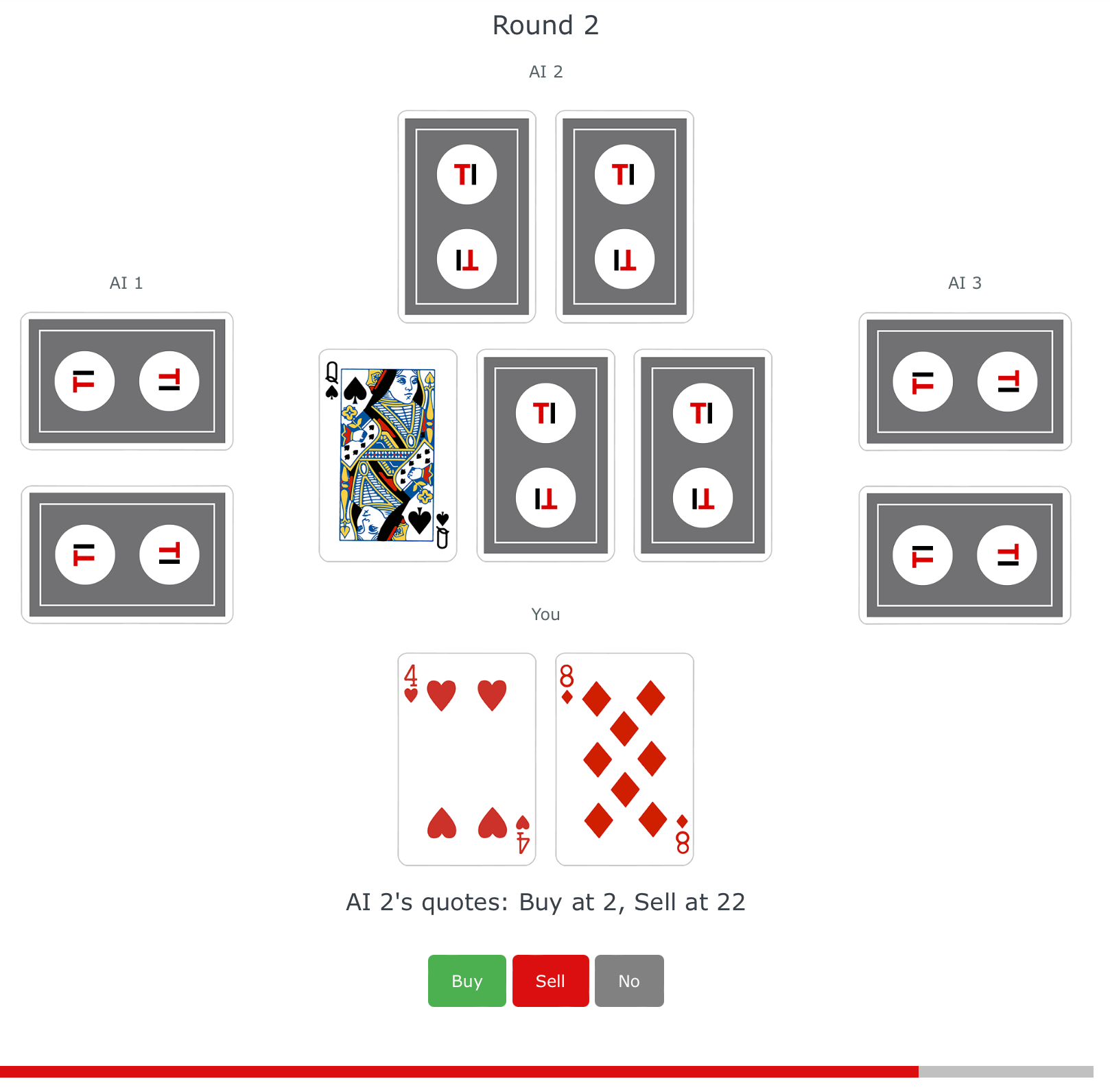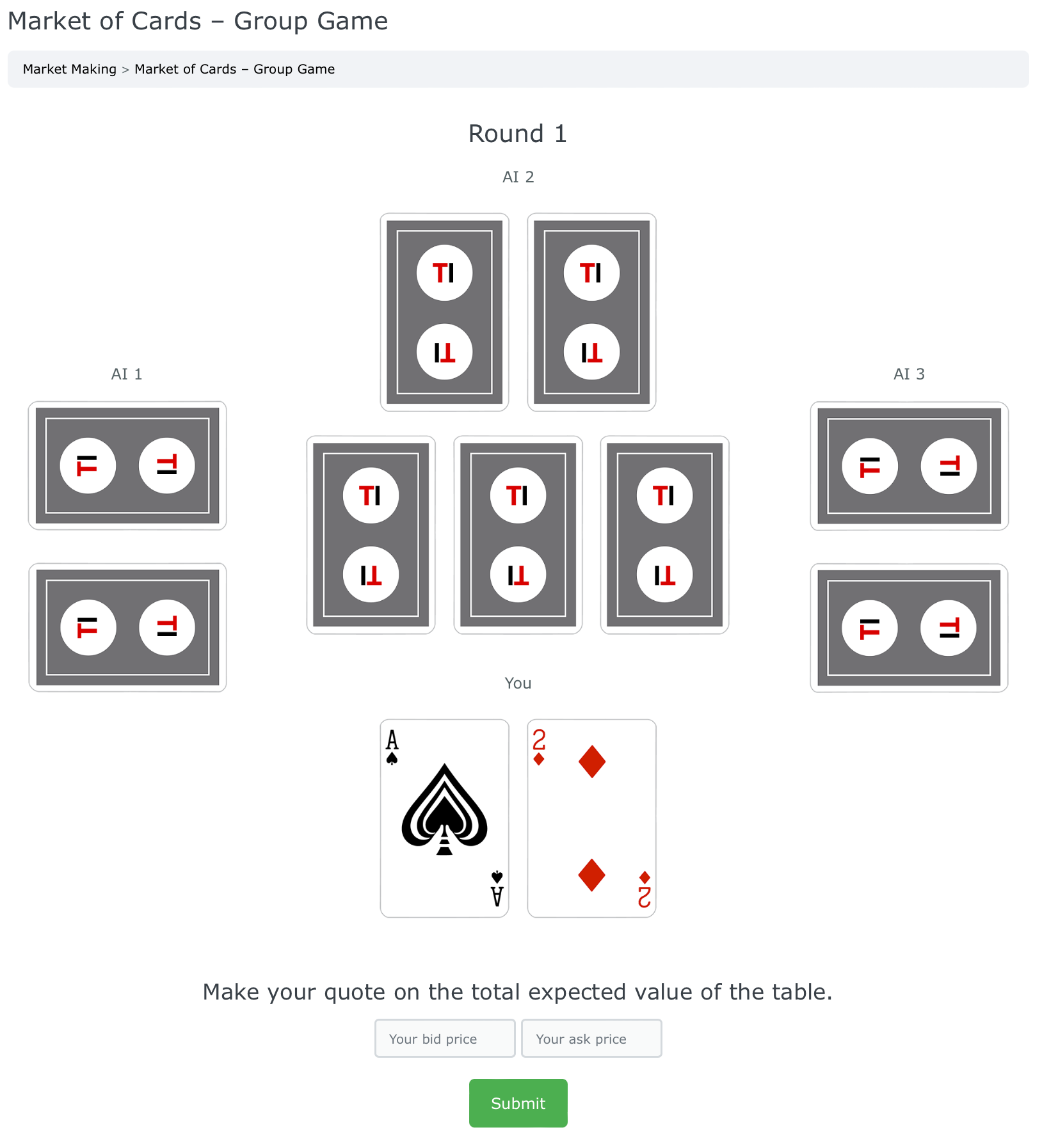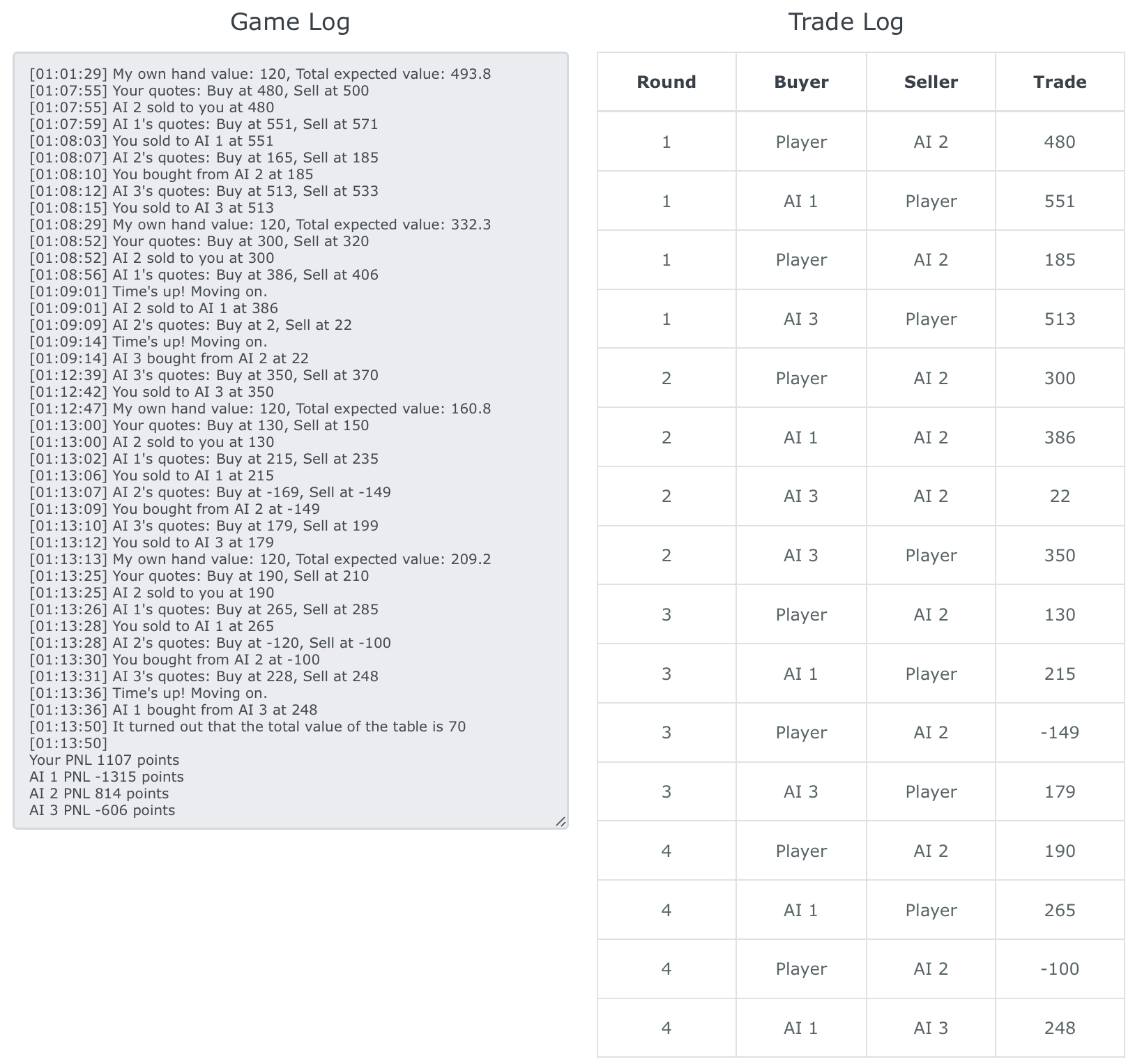It’s important for traders to control the art of quick decision-making and accurate risk assessment. But how do you practice these important skills, especially if you are in the midst of your preparation process for interviews at trading firms? Play “Market of Cards,” our new game that simulates the dynamics of a real trading market. Tailored to meet the needs of aspirant traders that are ready to go through their trading interviews, this game offers a fantastic opportunity to sharpen your trading instincts and strategies.
Table of Contents
The Game Mechanics
“Market of Cards” is a strategic, probability-based card game that combines the intrigue of classic card games with the excitement of market trading. Designed for multiple players (the user and multiple AI agents), this game challenges the player’s ability to predict, strategize, and make wise trading decisions based on limited information.
In “Market of Cards,” the players act as market maker, dealing with a deck of normal playing cards. With a unique scoring system that assigns different values to red and black cards, and a trading mechanism where players bid and ask based on their cards’ expected value, the game offers endless strategic possibilities.
Objective
The objective of the game is to make the most profitable trades based on the expected value of all the cards in play, being, all cards in the hands of the players and the three cards at the middle of the table. Players must consider not only the cards in their own hands to make a market, but also the information they can deduce from other players’ bids and asks. Furthermore, three cards lay closed at the start of the game. Each round, one of the cards opens, showing its value.
Card Values
- Cards 2 to 10 (both red and black) are worth 20 to 100 points, respectively.
- For red suits, Jack, Queen, King, and Ace are worth 110, 120, 130, and 140 points, respectively.
- For black suits, Jack, Queen, King, and Ace are worth -110, -120, -130, and -140 points, respectively.
- There is a setting where you set the Ace as the lowest value, which makes it always worth 10 (never -10).
Setup
- Shuffle a standard 52-card deck and deal two cards to each player.
- Place three cards closed on the table.
- Players should keep their cards hidden, knowing only their own hand.
Gameplay
- Player One Makes a Market: Player one provides bid and ask prices for the expected total value of all cards in play. This begins the trading phase.
- Other Players React: The other players may trade on these quotes if their expected value based on their own cards is higher or lower than the provided quotes. The first to react gets the trade.
- Next Player Makes a Market: Subsequent players adjust their expected values based on information from previous quotes and make their own market.
- Continue the Process: The process continues in turn, with each player gaining more information and adjusting their strategies. After every new round (a round is defined as when each player had a turn to make a market), one of the closed cards on the table opens up.
Winning and Scoring
In “Market of Cards,” success is measured by the profitability of your trades. Here’s how scoring works:
- Making a Trade: When a player trades on a quote, they are committing to a specific value for the total points of all 8 cards on the table. For example, if a player buys at ’80’, they are betting that the total value will be higher. The sellers is betting that the total value will be lower.
- Calculating Profit or Loss: After all closed cards are open and the game is finished, all cards will be revealed. If the total value is ‘100’, and a player bought at ’80’, they make a 20-point profit. Conversely, the player who provided the quotes and sold at ’80’ incurs a 20-point loss. This calculation is done for every trade that has been executed during the game.
- Winning the Game: The player with the highest score at the end of the game is declared the winner.
By blending strategy, prediction, and market know-how, “Market of Cards” offers a thrilling experience where every trade can lead to a profit or loss. Read the market and outplay your opponents!
Perform Under Pressure
Improve your quick decision making progress under time pressure! You can select the difficulty at the start of the game. It will define how much time you have to react on the quotes of your opponents. If you’re too slow, another AI trader will trade against the other AI trader. In the picture below, you see how the red line at the bottom is running, which indicated how much times is left to react.

Play With or Without Hint
It’s possible to enable/ disable the hint that provides you the current expected value of all cards in the game, based on the available information. The next screenshots give you an idea how these hints look like. First, without:


Keep Track of Logs and Trades
For an optimal learning environment, the logs will help you to always look back at what happend in the market. The trades overview will provide an overview of who traded against who at which price.

Strategy
Understanding your own cards is just the beginning. Smart players will observe the market, deduce information from other players’ actions, and adjust their strategies accordingly. Sometimes, you could also choose to just lock in the profit. For example, when you just sold at 240, but the next market is ‘180 at 200’, you could buy the 200 to lock in a 40 profit. Read more in this lesson.
The various scenarios will require different approaches. Exercise is key. You can keep track of your scores after each game as well. Try to push yourself to outsmart your opponents and set a new high score!
Adaptive AI Traders
The AI participants are designed to adapt their trading strategies based on market activity. They calculate their expected hand value and adjust their quotes accordingly. They also take into account any revealed cards on the table, continuously updating their market evaluations. Furthermore, they observe the bid-ask quotes of the other players in the market as well. They use this information to adjust their own quotes as well.
Ready to put your trading skills to the test? Click here to play “Market of Cards” now! Is it your first time on our platform? Sign up first for a trader or quant trader package to get access to the game.




